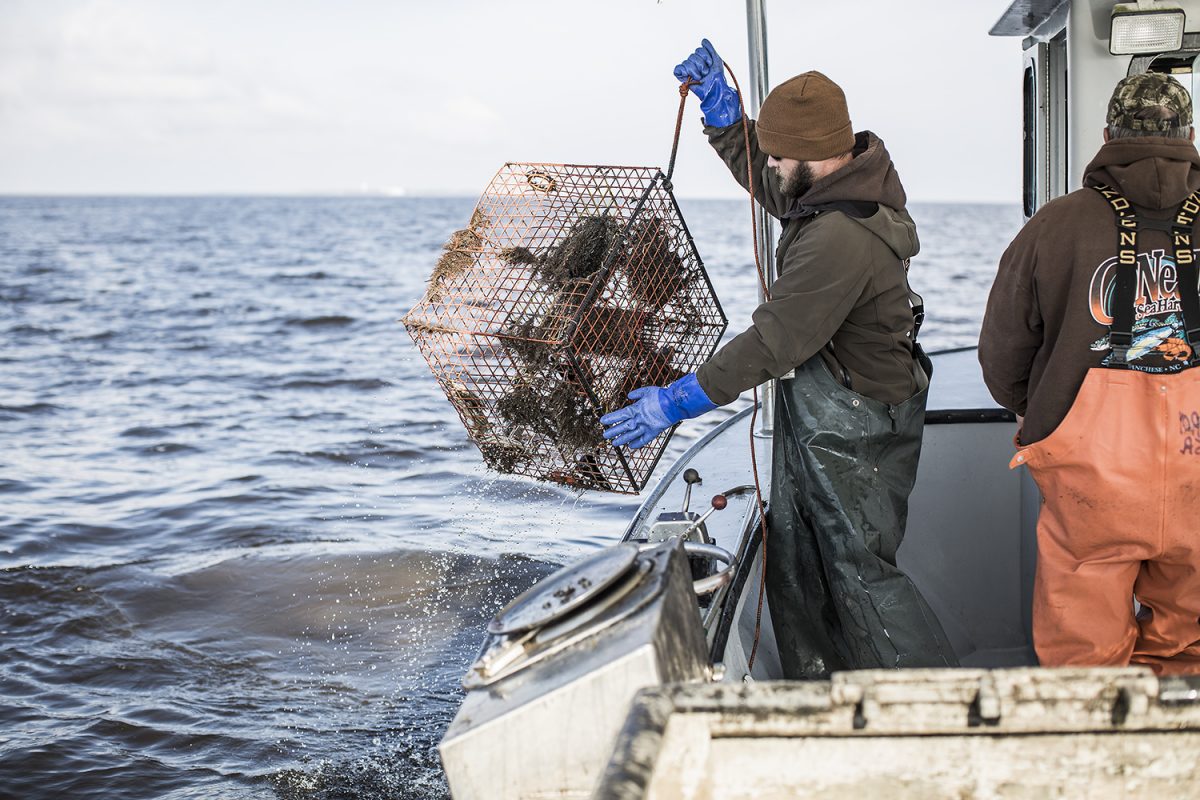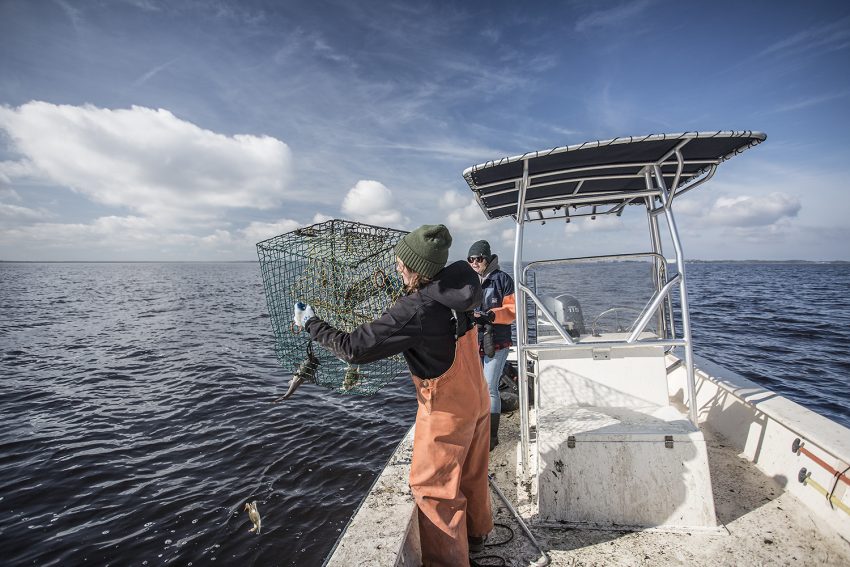Every year, crab pots and other fishing gear are lost in our sounds. The Federation and local partners work to remove these pots, which are hazardous to boats and marine life.
Since 2014, the Federation has led the Lost Fishing Gear Recovery Project to remove lost crab pots from North Carolina sounds. Crab pots can become lost in a variety of ways, including large weather events. With the help of various partners, commercial fishermen are hired to collect the pots during the pot closure period. This project creates opportunities for work during slower times of the year due to colder waters and what is now a month-long blue crab fishery closure, which is longer than in years past.
NC Coastal Federation works to remove lost crab pots with the help of fishermen – WNCT9
This program, which began in northeastern North Carolina waters and has since expanded statewide, improves fish habitat and water quality and supports the coastal economy. The program’s expansion enabled the Federation to hire more significant numbers of commercial fishermen to collect more lost pots.
This program was initially funded by the North Carolina Sea Grant and the NOAA Marine Debris Program. Beginning in 2014, NOAA provided additional support to continue the efforts in 2015 and 2016. The North Carolina General Assembly helped to provide funds to expand the program to a coastwide effort in 2017-2019 and again in 2022 as part of a large-scale marine debris removal project. The Commercial Fishing Resource Fund Program provided funding support to restart the project in 2021 after resources were not available to conduct the work in 2020. The Commercial Fishing Resource Program continued to fund the project through 2023-2025.
Recent Updates
2025 Update
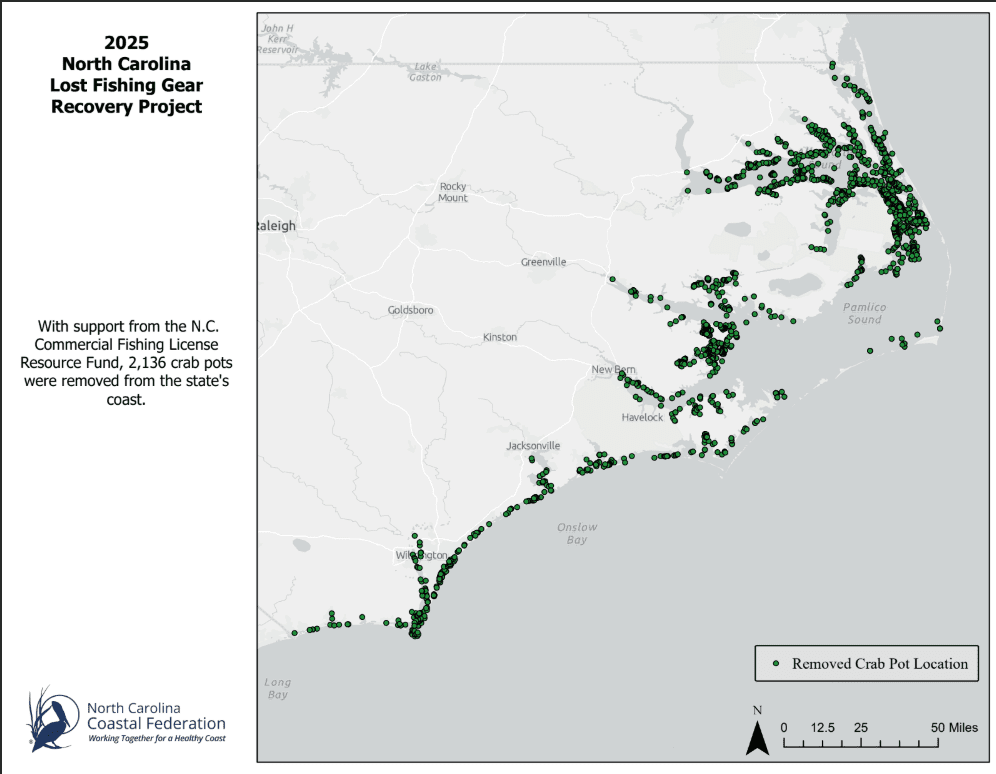
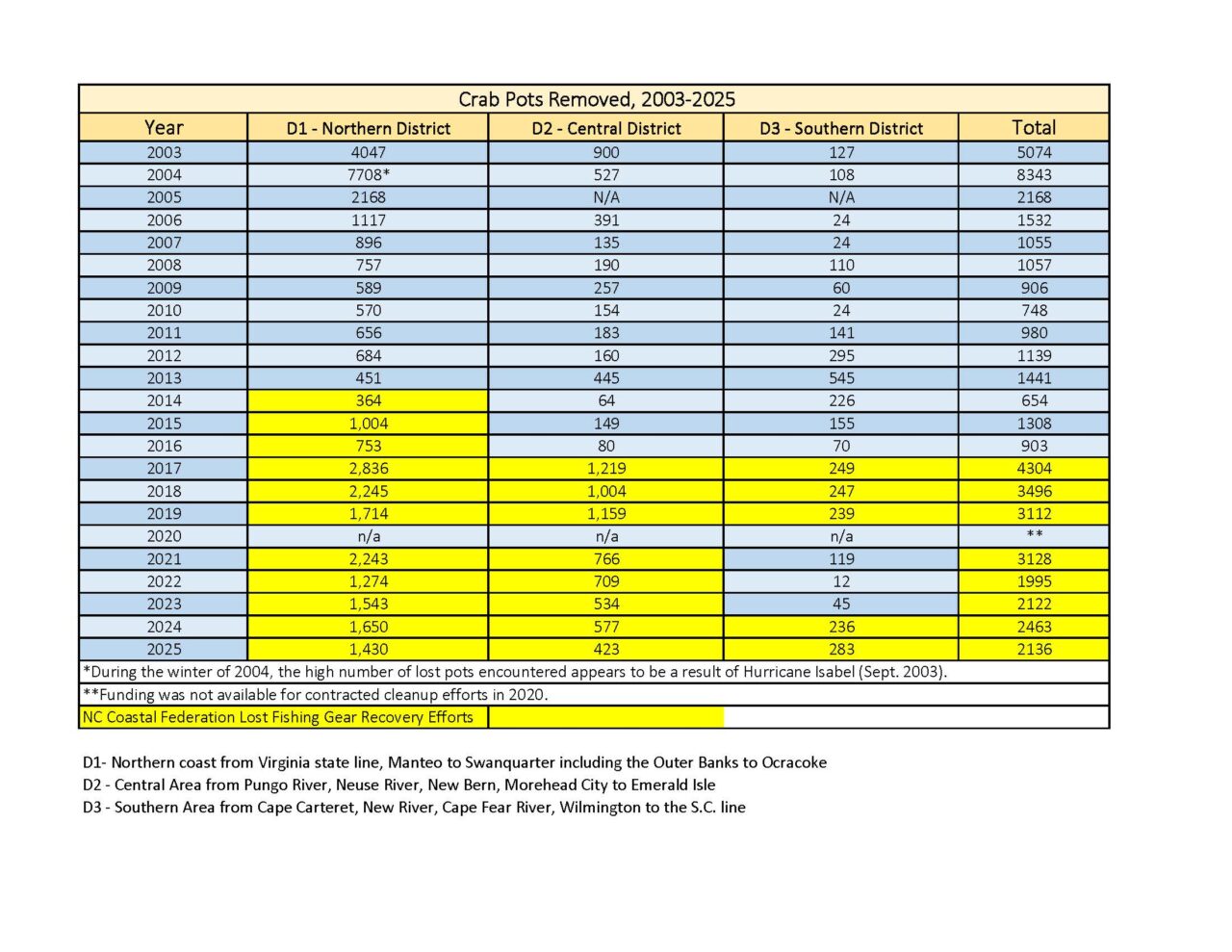
A total of 50 commercial watermen and women collected 2,136 crab pots in early 2025 as part of the grant-funded project in the northeast, central coast, and southeast coasts. The project was funded by the N.C. Commercial Fishing License Resource Fund. The Federation coordinated with the N.C. Division of Marine Fisheries and N.C. Marine Patrol for this project.
Region-by-region breakdown
- In Marine Patrol District 1, which covers the northeast region of the North Carolina coast from the Virginia line to Ocracoke, 17 boats made up of 34 commercial fishers picked up 1,430 crab pots.
- In Marine Patrol District 2, which spans from Ocracoke to Emerald Isle, 3 boats made up of 6 commercial fishers removed 423 crab pots.
- In Marine Patrol District 3, which spans from Cape Carteret to the South Carolina state line, 5 boats made up of 10 commercial fishers removed 283 crab pots.
In Marine Patrol District 1, whole pots recovered from the Albemarle and Pamlico Sound areas in good condition were sorted, stored, and made available for the rightful property owners to reclaim. Approximately 95% of these crab pots were claimed by their rightful owners through this process. This supports the coastal economy, as the value of a used crab pot put back into the industry is much greater than scrapping the gear for metal at pennies per pounded crab pot put back into the industry is much greater than scrapping the gear for metal at pennies per pound.
2024 Update
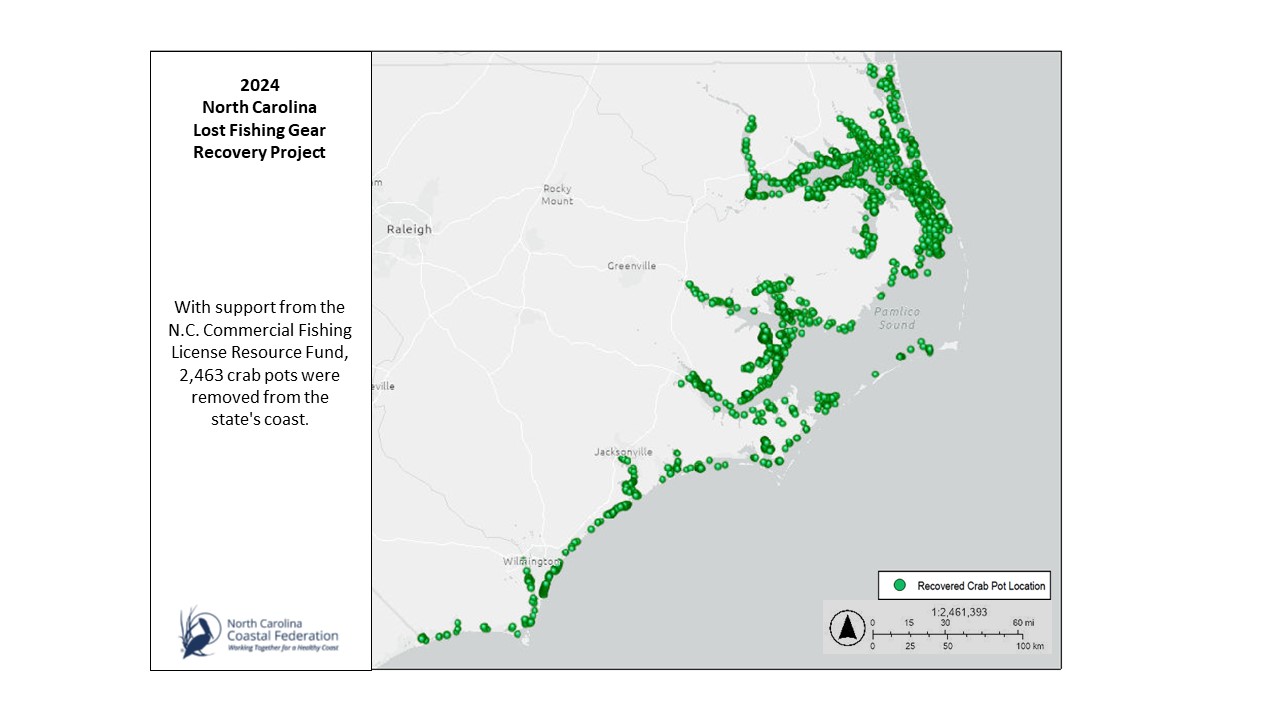
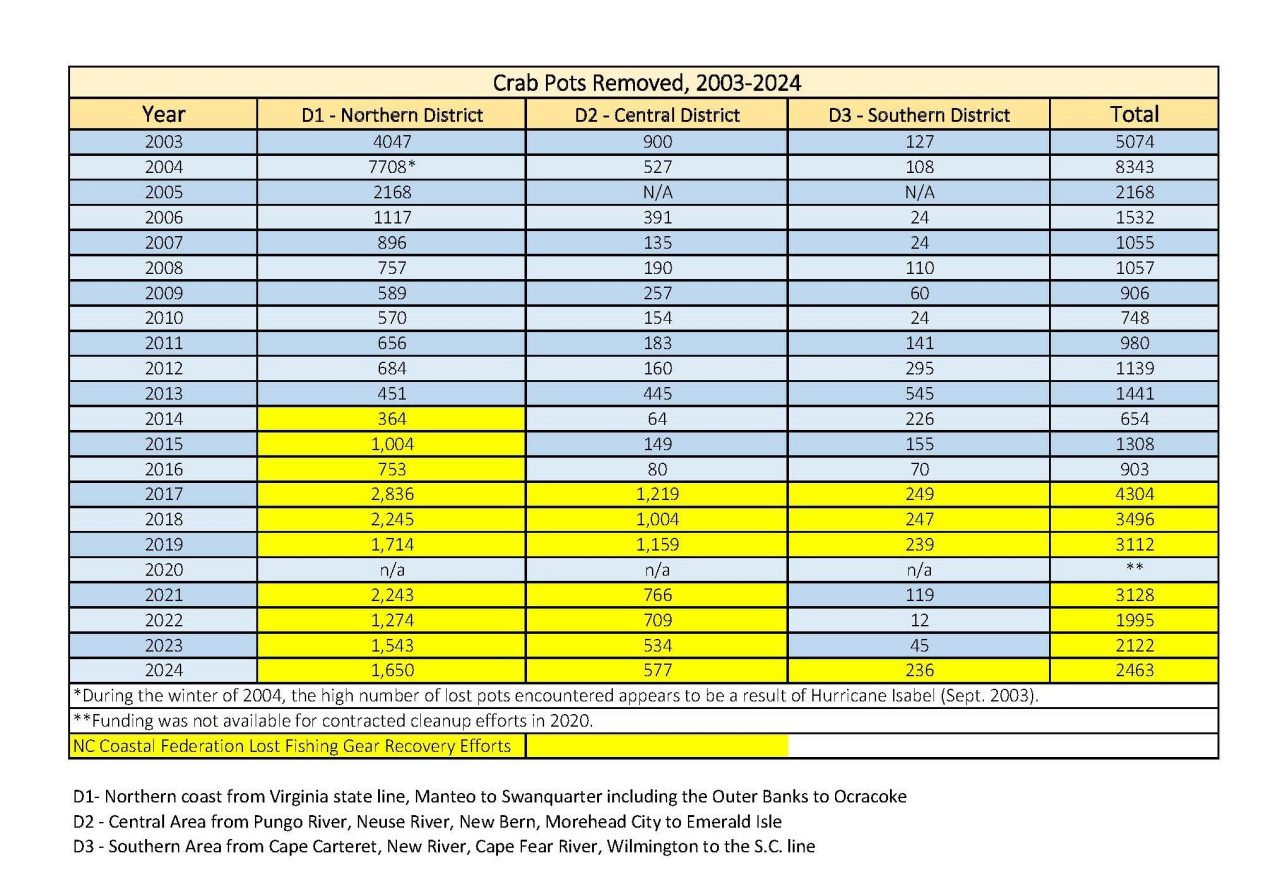
A total of 60 commercial watermen and women collected 2,463 crab pots in early 2024 as part of the grant-funded project in the northeast, central coast, and southeast coasts. The project was funded by the N.C. Commercial Fishing License Resource Fund. The Federation coordinated with the N.C. Division of Marine Fisheries and N.C. Marine Patrol for this project.
Region-by-region breakdown
- In Marine Patrol District 1, which covers the northeast region of the North Carolina coast from the Virginia line to Ocracoke, 20 boats made up of 40 commercial fishers picked up 1,650 crab pots.
- In Marine Patrol District 2, which spans from Ocracoke to Emerald Isle, 5 boats made up of 10 commercial fishers removed 577 crab pots.
- In Marine Patrol District 3, which spans from Cape Carteret to the South Carolina state line, 5 boats made up of 10 commercial fishers removed 236 crab pots.
In Marine Patrol District 1, whole pots recovered from the Albemarle and Pamlico Sound areas in good condition were sorted, stored, and made available for the rightful property owners to reclaim. Approximately 70% of these crab pots were claimed by their rightful owners. This supports the coastal economy, as the value of a used crab pot put back into the industry is much greater than scrapping the gear for metal at pennies per pound.
Check out the video below from Spectrum News for a close-up look at how the lost gear was pulled from coastal waters in 2024.
2023 Update
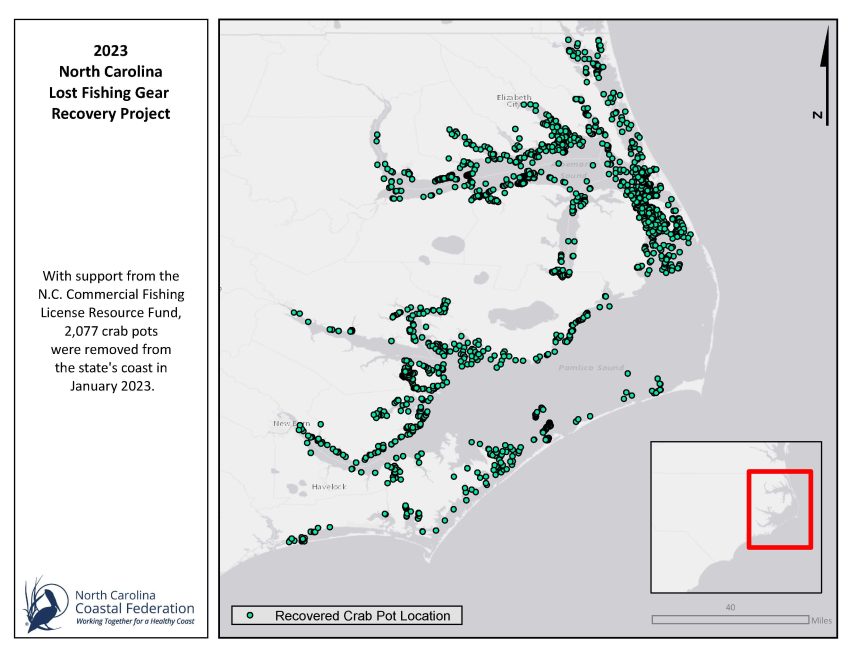
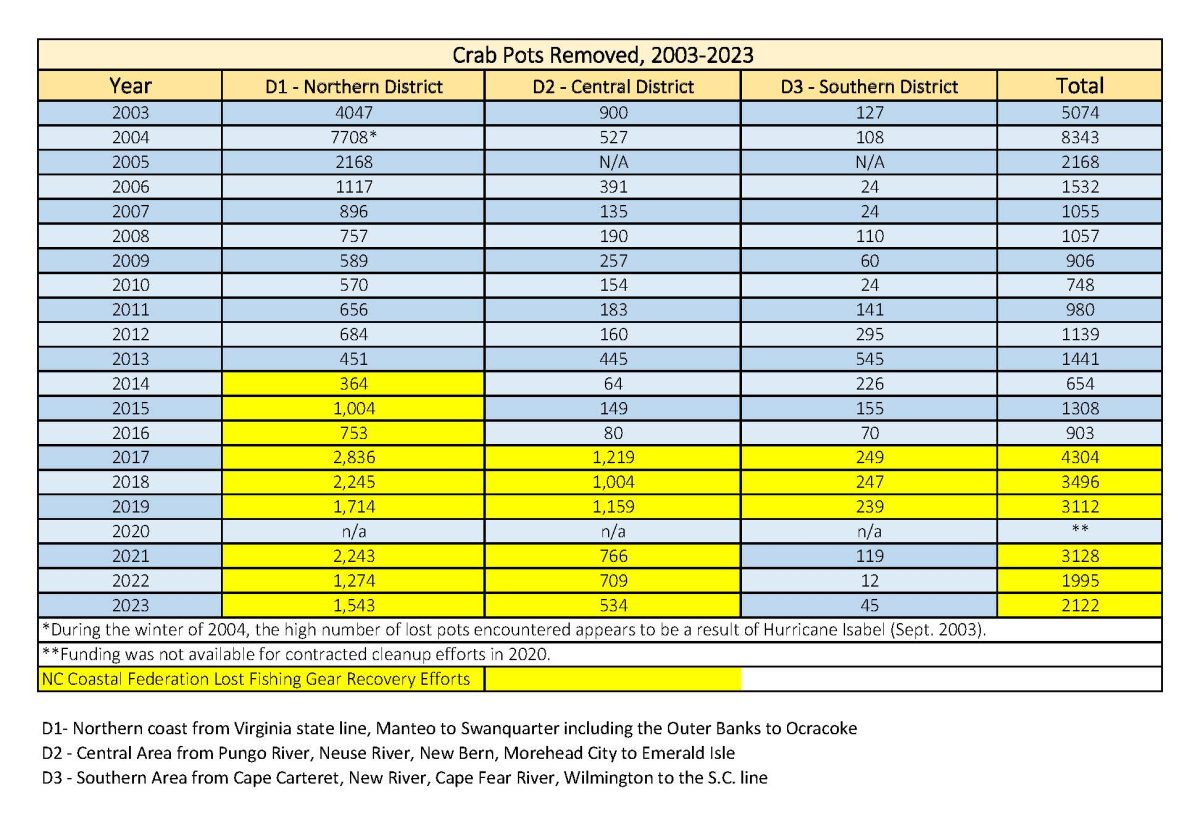
A total of 50 commercial watermen and women collected 2,077 crab pots in January 2023 as part of the grant-funded project in the northeast and central coast. The project was funded by the N.C. Commercial Fishing License Resource Fund. The Federation coordinated with the N.C. Division of Marine Fisheries and N.C. Marine Patrol for this project.
Region-by-region breakdown
- In Marine Patrol District 1, the northeast region of the North Carolina coast from the Virginia line to Ocracoke, 19 boats made up of 38 commercial watermen picked up 1,543 crab pots.
- In Marine Patrol District 2, which covers the central region of the coast from Ocracoke to Emerald Isle, six boats made up of 12 commercial watermen picked up 534 crab pots.
- In Marine Patrol District 3, which covers the southeast region of the coast from Cape Carteret to the South Carolina line, the N.C. Marine Patrol removed 45 pots in a separate effort from the grant-funded project.
In Marine Patrol District 1, whole pots in good condition recovered from the Albemarle and Pamlico Sound areas were sorted, stored, and made available for the rightful property owners to reclaim. More than 70% of these crab pots were claimed by their rightful owners through this process. This supports the coastal economy, as the value of a used crab pot put back into the industry is much greater than scrapping the gear for metal at pennies per pound.
2022 Update
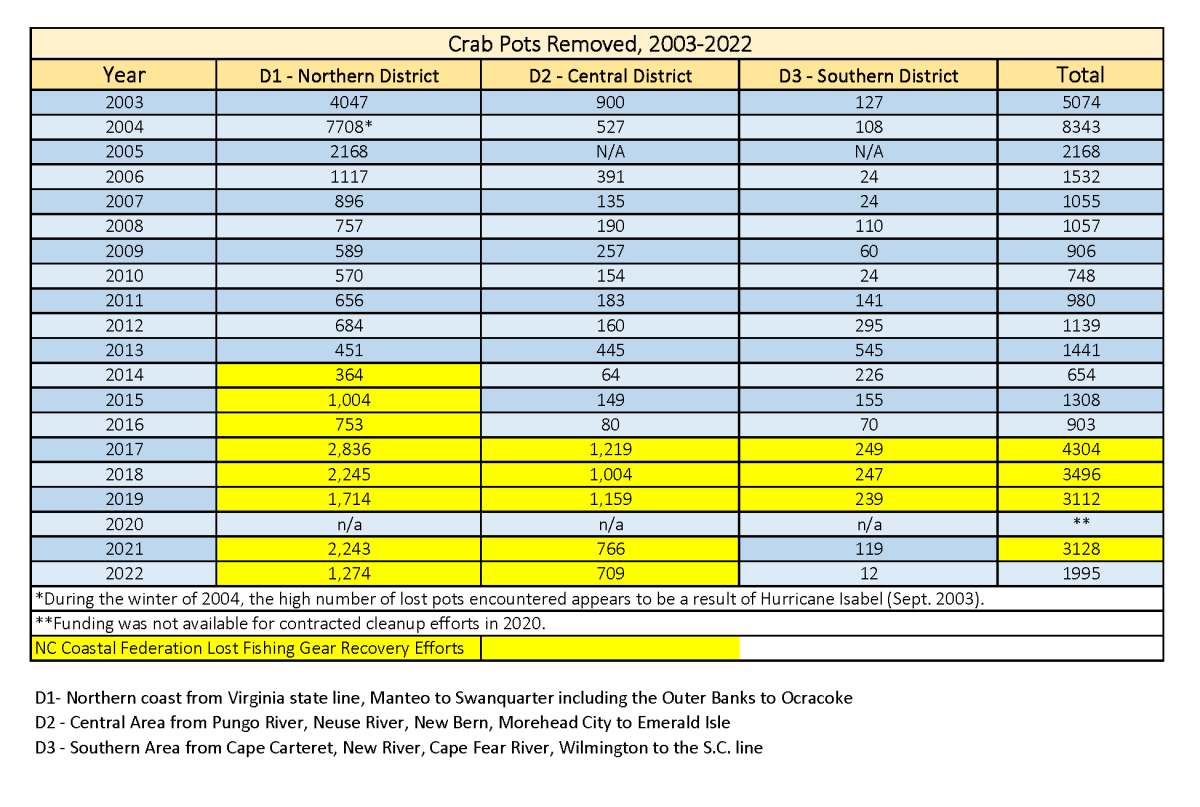
A total of 48 commercial watermen and women collected 1,983 crab pots in January 2022 as part of the grant-funded project on the northeast and central coast. The N.C. General Assembly provided $100,000 in funding for the Lost Fishing Gear Recovery Project and other large-scale marine debris removal through a Coastal Debris Cleanup Fund. The Federation coordinated with the N.C. Division of Marine Fisheries and N.C. Marine Patrol for this project.
Region-by-region breakdown
- In Marine Patrol District 1, the northeast region of the North Carolina coast from the Virginia line to Ocracoke, 18 boats made up of 36 commercial watermen picked up 1,274 crab pots.
- In Marine Patrol District 2, which covers the central region of the coast from Ocracoke to Emerald Isle, six boats made up of 12 commercial watermen picked up 709 crab pots.
- In Marine Patrol District 3, which covers the southeast region of the coast from Cape Carteret to the South Carolina line, the N.C. Marine Patrol removed 12 pots.
In Marine Patrol District 1, whole pots in good condition recovered from the Albemarle and Pamlico Sound areas were sorted, stored, and made available for the rightful property owners to reclaim. More than 80% of these crab pots were claimed by their rightful owners through this process. This supports the coastal economy, as the value of a used crab pot put back into the industry is much greater than scrapping the gear for metal at pennies per pound.
2021 Update
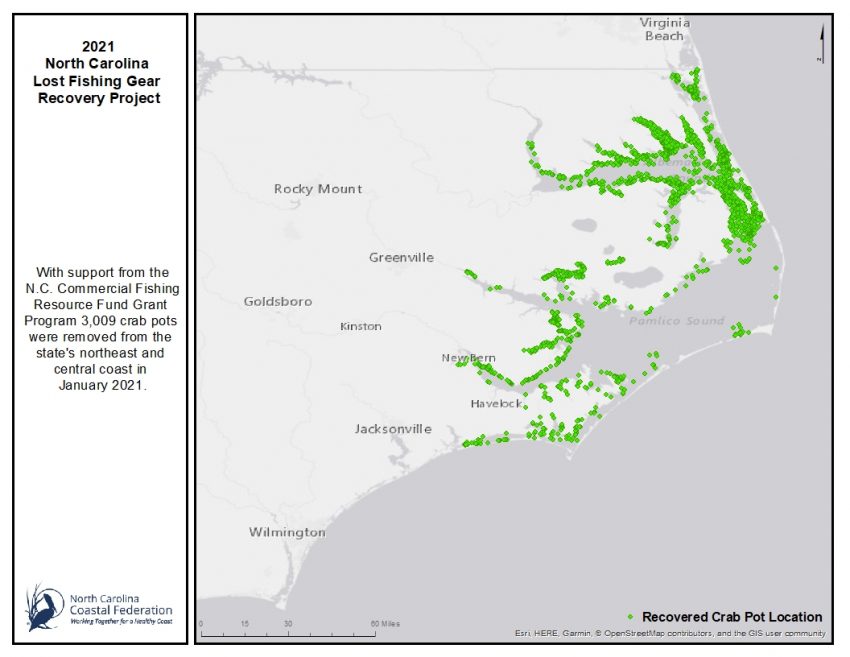
View 2021 Updates Marine Patrol Numbers
A total of 60 commercial watermen and women collected 3,009 crab pots in January 2021 as part of the grant-funded project on the northeast and central coast. The Commercial Fishing Resource Fund Program provided $115,599 for the project, with approval from the North Carolina Marine Fisheries Commission Commercial Resource Fund Committee and the Funding Committee for the North Carolina Commercial Resource Fund. The Federation worked with Dare County Public Works and coordinated with the N.C. Division of Marine Fisheries and N.C. Marine Patrol for this project.
Region-by-region breakdown
- In Marine Patrol District 1, the northeast region of the North Carolina coast from the Virginia line to Ocracoke, 21 boats made up of 42 commercial watermen picked up 2,243 crab pots.
- In Marine Patrol District 2, which covers the central region of the coast from Ocracoke to Emerald Isle, nine boats made up of 18 commercial watermen picked up 776 crab pots.
- In Marine Patrol District 3, which covers the southeast region of the coast from Cape Carteret to the South Carolina line, the N.C. Marine Patrol removed 119 pots.
In Marine Patrol District 1, whole pots in good condition recovered from the Albemarle and Pamlico Sound areas were sorted, stored, and made available for the rightful property owners to reclaim. More than 500 crab pots were returned to their rightful owners through this process.
2019 Update
A total of 78 commercial watermen and women worked in January 2019 to remove 3,112 crab pots from the North Carolina coast. The Lost Fishing Gear Recovery Project is part of a statewide marine debris removal effort led by the Coastal Federation with a $100,000 appropriation from the North Carolina General Assembly. This cleanup was conducted in all three Marine Patrol districts — covering all internal coastal waters.
Region-by-region breakdown
- In Marine Patrol District 1, which covers the northeast region of the coast, 24 boats made up of 48 commercial watermen picked up 1,714 crab pots.
- In Marine Patrol District 2, which covers the central region of the coast, eight boats made up of 16 commercial watermen picked up 1,159 crab pots.
- In Marine Patrol District 3, which covers the southeast region of the coast, seven boats made up of 14 commercial watermen picked up 239 crab pots.
2018 Update
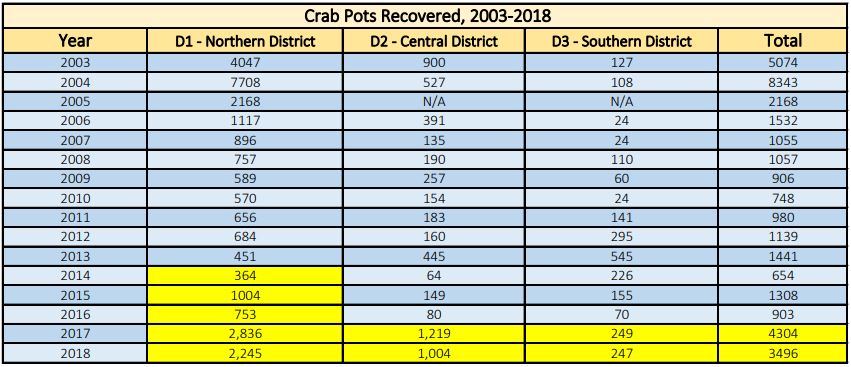
This statewide project continued to serve all marine patrol districts in 2018 thanks to another $100,000 in state funding for the project. A total of 76 commercial watermen worked throughout the coast of North Carolina in January 2018 to collect 3,496 lost crab pots. The project lasted from Jan. 17-27, with boats working anywhere from two to six days, depending on the Marine Patrol district.
Region-by-region breakdown
- In Marine Patrol District 1, which covers the northeast region of the coast, 24 boats made up of 48 commercial watermen picked up 2,245 crab pots.
- In Marine Patrol District 2, which covers the central region of the coast, eight boats made up of 16 commercial watermen picked up 1,004 crab pots.
- In Marine Patrol District 3, which covers the southeast region of the coast, six boats made up of 12 commercial watermen picked up 247 crab pots.
Program History
From 2014-2016, the Federation and partners conducted this project only in the first marine patrol district, or northeastern North Carolina waters. Over the three years, 41 total fishermen were employed in the following areas: Albemarle, Croatan, Currituck, Pamlico, and Roanoke Sounds; Alligator River; Bulls and Kitty Hawk Bay.
From Crab Pot to Oyster Reef
2017 Statewide Expansion
Learn More
- Final report for the project, 2024
- Final report for the project, 2021
- Final report for the project, 2018-19
- Final report for the project, 2017-18
- Coastal Review Online’s coverage of the 2017 project
- Final report for the project, 2016-17
- Final report on the 2014 lost fishing gear recovery project
- 2016 project summary
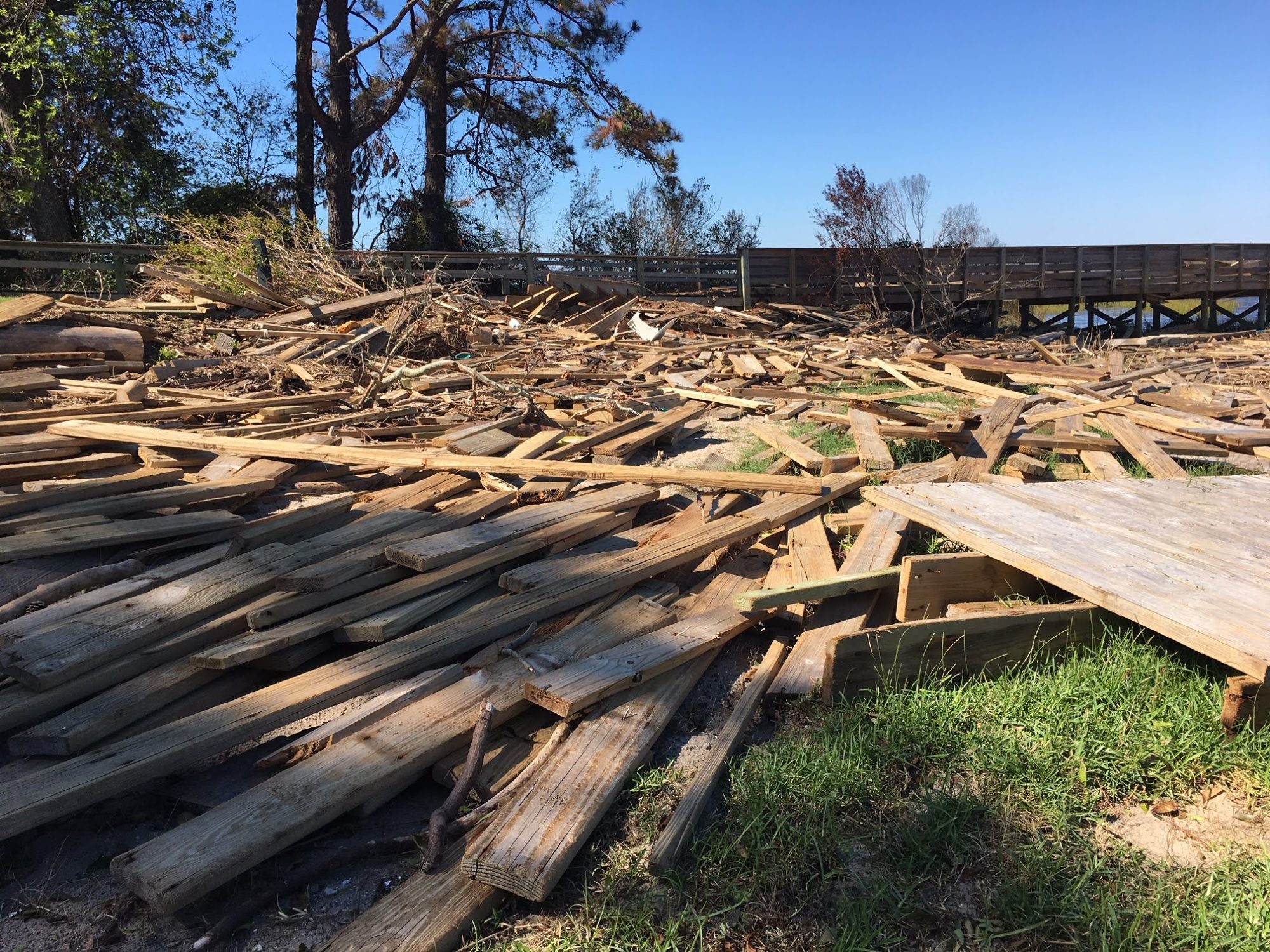
Tackle Trash
You can help clean up our coast—from hurricane debris to microplastics.

